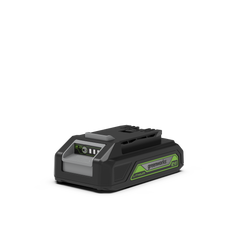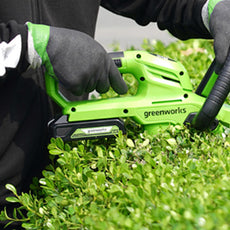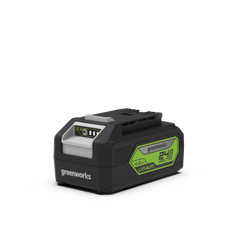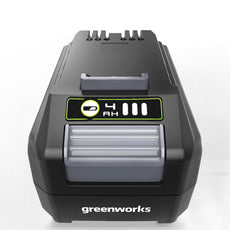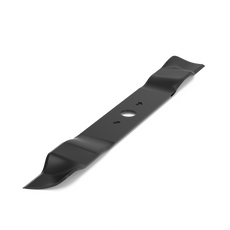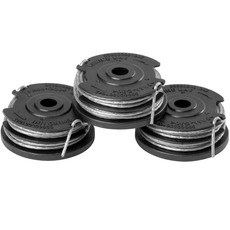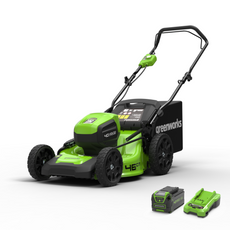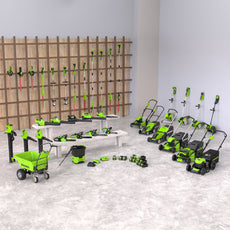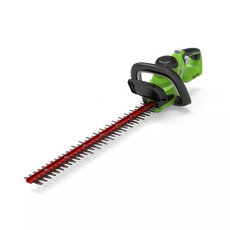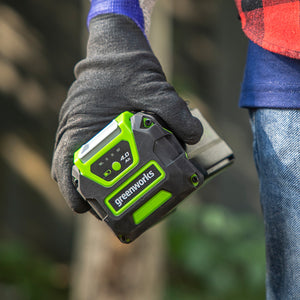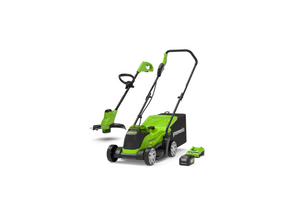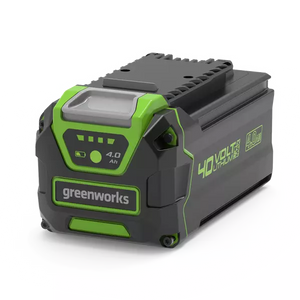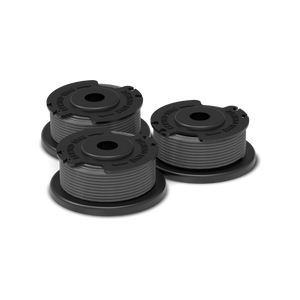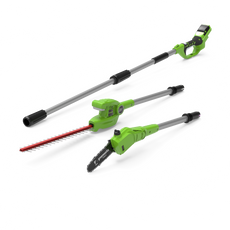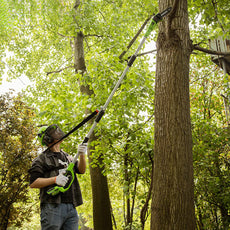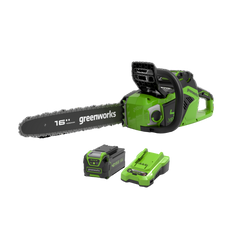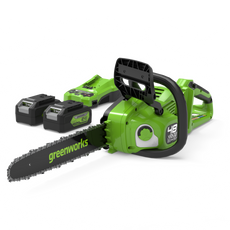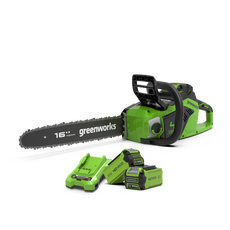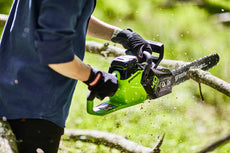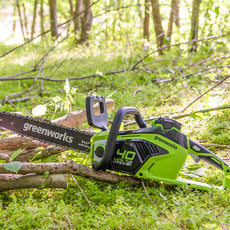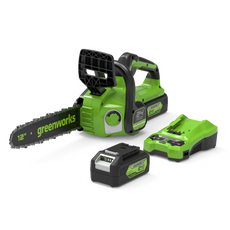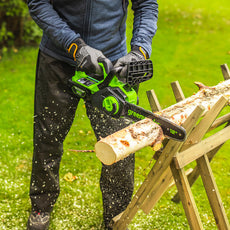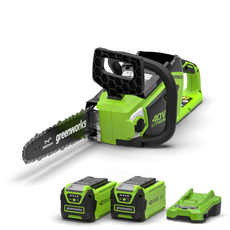Electric vs. Gas Chainsaws
It's time to bust the myth that battery-powered chainsaws can't compete with gas chainsaws. At Greenworks, our brushless motors deliver the consistent speed, torque and power needed for faster, smoother and cleaner cuts.
Gas chainsaws stall and bog down, using more fuel and creating additional friction.
Gas-Burning Chainsaws
Gas-burning chainsaws are powered by mini-explosions in the motor by igniting air and gas mixture with a spark. These mini-explosions can be unpredictable and dangerous – especially in dry, wildfire-prone areas of the country. Gas-burning chainsaws also use a mixture of gas and oil to run, which can be a tricky balance. Too much oil can produce excess smoke, while not enough can damage the chainsaw engine.
Electric Chainsaws
Great news: battery-powered chainsaws don’t rely on sparks, gas mixtures or small explosions to harness energy to run it. Instead, battery-powered chainsaws with brushless motors utilize electromagnets to attract or repel each other, energizing the metal coils in the rotor and making the motor spin. The result? A more powerful, efficient and longer-lasting motor – not to mention more sustainable!
Why choose an Electric Chainsaw?
Let’s dive into the best reasons to choose a battery-powered chainsaw:
1. Performance
For electric chainsaws, brushless motors make the difference. Let's dive into the practical application – what does that mean for you? Battery-powered chainsaws like Greenworks are powered by brushless motors – with an assist from a smart-sensing microchip that automatically adjusts power to ensure consistent chain speeds, providing a smooth, crisp cut.
Whether you're trying to quickly cut down a few rouge branches or tackling a large fallen tree, the smart-sensing technology in an electric chainsaw will draw the necessary power – making it less likely to bog down when you hit resistance. Bonus: high-efficiency cutting will maximize runtime and cut speed.
On the other hand, chainsaws without brushless motor technology (like gas chainsaws) have more difficulty maintaining constant chain speeds. The increased friction can slow the chain speed, causing the chainsaw to bog down when it hits resistance – creating erratic, uneven cuts with rough edges and splinters.
2. Run Time
Battery-powered chainsaws have become increasingly popular thanks to their unmatched convenience and user-friendly design. To compete head-to-head with their gas counterparts, brands like Greenworks conduct stringent product testing. These tests measure the runtime of each chainsaw unit by counting the number of 4x4 lumber cuts on a single battery charge. In this runtime race, the amp hours play a crucial role—higher amp hours translate to extended cutting time. The combination of voltage and amp hours determines the chainsaw's overall power level.
What sets battery-powered chainsaws apart is their freedom from the hassles of gas. A simple swap to a freshly charged battery keeps the power going and your project on-task.
If you're already invested in a battery voltage platform (24V, 40V or 60V), you can use the same Greenworks batteries across your tools, providing a hassle-free way to keep cutting. Buying a battery-powered chainsaw is the way to go for buyers looking for sustained performance and power without frequent refueling interruptions.
3. Power
Greenworks battery-powered chainsaws deliver 20% more torque and quicker, more efficient cutting than a 40ml gas chainsaw equivalent. Greenworks chainsaws like the 60V 40cm Chainsaw provide constant power at 2 kW - giving you up to 110 cuts per 4Ah battery.
Plus, you can forget the days of wrestling with the pull cord to start up a gas chainsaw. You’ll love the Greenworks No Prime, No Choke, No Pull (™) easy start system – click in a fully-charged battery, press start and you’re ready to cut.
4. Weight
If you're in search of a chainsaw that offers comfortable and easy usage for long periods, then a battery-powered chainsaw is the perfect option for you. Electric chainsaws like Greenworks are designed to be 20% lighter than gas chainsaws and produce 70% fewer vibrations, making them ergonomic and comfortable. Plus, their lightweight design provides better control during cutting sessions, which means you can use your new chainsaw safely and with ease.
5. Noise
You can hear a gas-powered chainsaw a few streets away — an annoying revving that can go on for hours. Greenworks battery-powered chainsaws are up to nine times quieter than a gas chainsaw, your eardrums — and neighbors! — will appreciate the reduced noise.
6. Emissions
Who can forget the cloud of gassy fumes surrounding a gas chainsaw? With battery chainsaws, you’ll breathe clean air while you cut – and not smell like a gas station after each use.
7. Maintenance
Gas chainsaws require mixing fuel — a tedious and time-consuming process, especially if you’re in the middle of a big project. Gas chainsaws also need frequent tuning with fresh spark plugs and air filters and adding a preservative to the oil-gas mixture if you’re not planning to use the chainsaw again soon.
In contrast, battery-powered chainsaws only require charging the battery, refilling the oil and storing it correctly to avoid spillage.
8. Price
Choosing between electric and gas chainsaws? Price matters – and electric chainsaws win on the wallet front. They're budget-friendly upfront and save you money with lower maintenance and no fuel costs. Plus, they're quieter and eco-friendly, making your work easier and greener. It's not just about the initial price tag; it's a long-term investment that will pay off, year after year.





